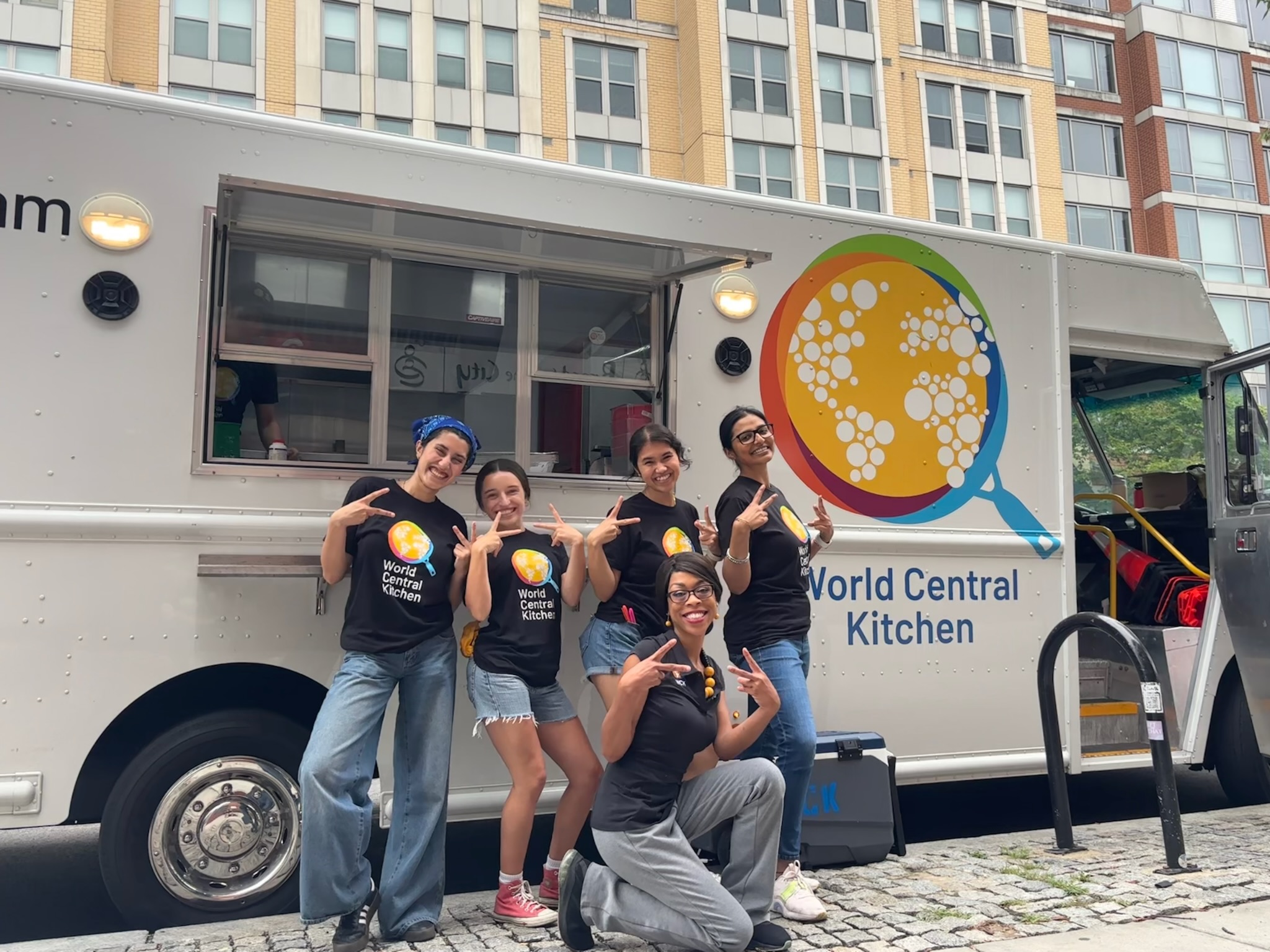While many George Washington University interns spent their summer on Capitol Hill, the interns at World Central Kitchen found themselves on a fork lift, at Restaurant Depot, and on a Shaw neighborhood sidewalk. It started around a conference table joking about how amazing it would be to cook out of WCKs signature paella pans. Fast forward to a month later, we were encouraged to operate a field kitchen as a situational exercise. We had three days to fundraise, identify a local community in need, a partnering organization, develop a menu and culinary team, gather all of the food and equipment, and spread the word.
We reached out to various organizations dedicated to meeting the needs of underserved communities in D.C. We partnered with Bread for the City because their operations matched our project the best. Some organizations did not accept cooked food from external projects but Bread for the City not only accepted warm cooked meals but also had space for a WCK food truck. More importantly, they served various D.C. communities in need with vital resources. During the summer, they hosted a farmers market with fresh produce on Saturdays to low income families. Thus, we had a foundation to begin planning our project in the Shaw Neighborhood of D.C.
We continued our outreach efforts by contacting other organizations that were mission-driven with their service to their communities. First, we went to the Shiloh Baptist Church and informed them about our upcoming event. They referred us to the Phyllis Wheatley YWCA women’s shelter to continue spreading the word. A flyer was created and sent to 11 organizations throughout D.C., including Everyone Home DC and DC Greens.
The execution of the feeding event was conditional on the availability of the financial resources necessary to fund it. The team set up a fundraising page on World Central Kitchen’s fundraising platform on July 25th, with a goal of $2,000. Given the limited time available before the day of the event itself, we were unable to establish private partnerships with foundations and corporations, but had to rely on family and friends instead. Our generous network allowed us to raise $1,940 in less than one week, which completely covered the event expenses.
Proper planning was at the heart of this project, with distribution serving as a crucial component. From coordinating volunteers, setting up the food truck and tents to cooking, assigning roles, coordinating volunteers, connecting with communities, and distributing meals, everything unfolded smoothly and efficiently. Distribution held special significance, as it reflected how we delivered on our mission. Every WCK member—whether staff, interns, or volunteers—worked diligently to serve the community with dignity and respect. All of us made every effort to uphold WCK’s policy of serving people without restriction, ensuring that community members could take as many meals as they needed. Serving with dignity meant that every individual was welcomed without limitation, reinforcing the spirit of compassion and care at the heart of the operation.
Strict hygiene standards were maintained throughout. Meals were packaged with care to prevent contamination, and all of us wore food service gloves. Separate serving and scooping utensils were arranged for different dishes to avoid any unintended mixing of food. Moreover, each meal was carefully packed in high-quality clamshell containers to prevent leakage and ensure food safety. Additionally, Cambros were used to maintain the proper temperature, allowing meals to be served hot and fresh. The community line was well-organized, and the committed efforts of the WCK team ensured fast packaging and careful handling of meals. This efficiency stood as a model of effective distribution in action. The success of the first meal distribution helped to refine our performance for the second round. For many, including interns and even some staff, this was their first experience, making the achievement all the more commendable. Strong communication and mutual understanding among us culminated in a synchronized and well-managed distribution process. What stood out most was WCK’s culture: every idea mattered, and everyone contributed with sincerity and honesty. Leadership was not confined to one person; instead, each member embodied leadership through their responsibilities.
The impact of this project extended far beyond the meals we served; it was about building trust, restoring dignity, and creating moments of genuine connection within the community. For many, this was more than just receiving food; it was being seen, heard, and cared for. One especially touching moment came when a grandmother arrived with her two young grandchildren. Their eyes lit up when they discovered we offered vegetarian and vegan options. That simple offering made them feel included, and for us, it was a reminder that thoughtful planning can create powerful change. The project not only met immediate nutritional needs but also reinforced WCK’s commitment to equity, compassion, and community-centered service. Interns, staff, and volunteers worked together to ensure that every individual, regardless of background or circumstance, could walk away with not just a meal, but a sense of dignity.
The success of the operation energized everyone involved, turning what could have been a routine distribution into a shared experience of purpose and pride. The collective effort demonstrated how intentional humanitarian work, rooted in respect, care, and attention to detail, can leave a lasting impact on both those we serve and those who serve.


